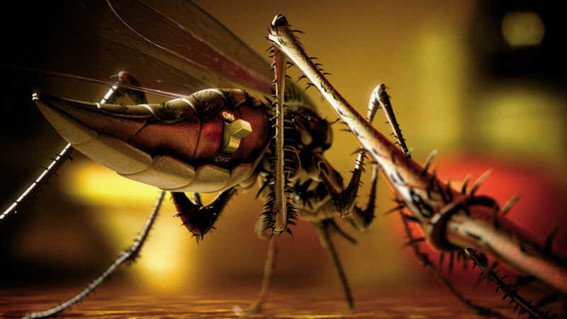
What is the real cost of manipulating populations of a species that threaten human health?
A couple of years ago the news from all over the planet alerted the population about the appearance of a "new" disease: Zika. Transmitted by mosquitoes, this disease shares characteristics in its clinical picture with other diseases transmitted by this animal. The fear increased when it was later related to the possibility that in pregnant women, the picketing could cause the newborns to suffer neurological alterations. But since then what has been done and what are the existing measures to prevent this type of disease?
Let's start by defining the substance of the problem, which is what scientists have done up to now. Aedes Aegypti and Anopheles are the best-known mosquito species on the planet, because they transmit devastating diseases; and not just zika, but malaria and dengue. In 2015 alone, approximately 212 million malaria patients were reported globally and close to half a million deaths. The basic mechanism of transmission is similar in all cases. Infected mosquitoes harbor viruses or parasites in their salivary glands. When they bite humans, viruses or parasites enter the human bloodstream. Then, a new patient will require medical attention in a short time.
So far scientists have tried to generate vaccines that help immunize people living in the areas most affected by these diseases; that is, in coastal-tropical regions such as southern Africa, southern Asia, Central America, South America and Mexico. However, obtaining vaccines has not been easy. As an example, the first vaccine against malaria was endorsed in 2015, with an immunization efficiency of 26 to 50%. In some cases the effect is temporary and has not been able to cover the demand in the affected regions.
Therefore, it has been proposed to assume a preventive attitude and control the disease before its appearance. In short, erase the presence of mosquitoes in the most affected areas. And when we say eliminate we talk about exterminating mosquito populations, which creates ecological fears that we will discuss later. But how can we eliminate the mosquito populations that cause so much trouble?
The group ISCA Technologies in California, has devised three simple and cheap methods to be used in any region of the world. The mechanisms are based on the use of particles called semiochemicals, natural odorant particles used for communication and modification of behavior between species-an example of semiochemicals are pheromones. ISCA Tech has generated a mixture of odorants that simulate human smell, which is highly attractive to mosquitoes. They claim that their methods avoid other practices, such as spraying large areas of land excessively and making the elimination of mosquitoes more efficient. Currently, small-scale trials are starting in Tanzania, Brazil and the United States.
The first method is called "the Trojan cow". It consists of spraying cattle with semiochemicals to attract mosquitoes. These sting cattle that were previously supplied with toxic agents - as dewormers. The result is the imminent extermination of mosquitoes. The second method consists in sprinkling with the semiochemicals areas potentially used by the females to reproduce. After the rain, the females are attracted and deposit their eggs that hatch and generate new larvae. The sprayed odorant mixture also contains a bacterium called Bacillus thuringiensis israelensis, which is capable of selectively killing the larvae of white mosquitoes. The third method exploits the need for mosquitoes for sugar - that is, mosquitoes do not feed on blood alone. Mixtures of natural sugars that mimic the nectar have been developed, and the proposal is to spray walls and fences with the mixture but also with insecticides.
In addition to the strategies outlined above, there is a new inclination to use genetically modified mosquitoes to be resistant to infectious agents. Specifically in the case of malaria, researchers from the Malaria Research Institute of the Johns Hopkins School of Public Health have managed to generate mutant mosquitoes to the FREP1 gene through the novel CRISPR-Cas9 technique. This technique allows to eliminate genes specific to the genome with surgical precision. The idea is that FREP1 is related to the recognition of parasites in the gut of mosquitoes, and is necessary for infection. Simply put, if mosquitoes do not express the FREP1 gene then they are immune to malaria infection. Although these mutant mosquitoes have a somewhat diminished growth, the idea is to populate the affected areas with the mutant mosquitoes. The expected result is that the mosquitoes eventually become resistant to plasmodium - the infectious agent.
The benefits that these measures can offer are insurmountable from a social and economic point of view. Evidently, mortality rates and cases of infections would decrease considerably. The economic impact it offers is also unbeatable, since it would reduce the costs of medical services -required mainly for third world countries, which are the most affected. On the other hand, there are still uncertainties about the use of these control strategies. The main one is the ecological and environmental impact that genetic manipulation of a species of organisms may have. Let's not even talk about eliminating it completely. What impact will it have to establish measures of this kind? Since elementary school we have been taught that living organisms establish relationships that lead to an environmental balance. Eliminating mosquitoes that spread diseases that affect humans will surely cost some money, even if we do not know it yet. Undoubtedly, greater efforts are required, not only to provide a therapeutic or preventive option for the most vulnerable people and who have been plagued by these types of diseases for a long time. It is also necessary to reassess and choose responsibly measures that harm the environment minimally.